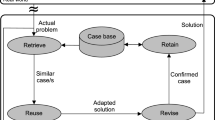Abstract
Although we are living in the era of big data, in many real-world applications, being able to access the right set and quantity of data is still a challenging task. One solution to address this drawback is to transform the existing information and knowledge from its tacit form back to data which can be used to simulate and regenerate the required knowledge in different scenarios for further analysis in explicit form. In this paper, we present our developed fuzzy inference-based learning system to achieve this objective. Our proposed framework is based on both conventional fuzzy-based modelling and the adaptive network-based fuzzy inference system (ANFIS) that first transforms the existing tacit information and knowledge into a fuzzy form which is then fed into ANFIS to develop a trained model that regenerates them for analysis purposes. We validate our proposed model and demonstrate its accuracy to estimate the fuel efficiency of heavy duty trucks using real-world data.









Similar content being viewed by others
Notes
This report can be accessed through the following link: http://www-cta.ornl.gov/cta/Publications/Reports/ORNL_TM_2011_471.pdf.
This report can be accessed through the following link:http://www-cta.ornl.gov/cta/Publications/Reports/ORNL_TM_2008-122.pdf.
References
Witten, I.H., Frank, E., Hall, M.A.: Data Mining Practical Machine Learning Tools and Techniques, 3rd edn. Elsevier, Amsterdam (2011)
Han, J., Kamber, M., Pei, J.: Data Mining: Concepts and Techniques, 3rd edn. The Morgan Kaufmann Series in Data Management Systems. Morgan Kaufmann, Burlington (2012)
Yin, Y., Jiang, D.: Research and application on intelligent parking solution based on internet of things. In: Fifth International Conference on Intelligent Human-Machine Systems and Cybernetics (20130
Davenport, T.H., Redman, T.C.: Build data quality into the internet of things. Wall Str. J. (2015)
GS1 UK, IBM, C. S. of M. (KTP project) The Institute of Grocery Distribution, and Value Chain Vision, “Data crunch report: The impact of bad data on profits and customer service in the UK grocery industry,” 2009
Jamshidi, A., Yazdani-chamzini, A., Haji, S.: Developing a new fuzzy inference system for pipeline risk assessment. J. Loss Prev. Process Ind. 26(1), 197–208 (2013)
Zakeri, A., Saberi, M., Hussain, O.K., Chang, E.: A heuristic machine learning based approach for uti-lizing scarce data in estimating fuel consumption of heavy duty trucks. In: The 9-th International Conference on Intelligent Networking and Collaborative Systems (INCoS-2017) (2017)
Meadow, C.T.: Text Information Retrieval Systems. Academic Press, San Diego (1992)
Babuska, R., Sousa, J., Verbruggen, H.B.: Fuzzy Prédictive Control Based on Human Reasoning, pp. 1–6. Delft University of Technology, Delft (1995)
Banks, W.: Linguistic Variables: Clear Thinking with Fuzzy Logic, Byte Craft Limited, IEEE Toronto Section, Toronto (2008)
Zadeh, L.A.: The concept of a linguistic variable and its application to approximate reasoning-I. Inf. Sci. (Ny) 8, 199–249 (1975)
Zhou, M., Jin, H., Wang, W.: A review of vehicle fuel consumption models to evaluate eco-driving and eco-routing. Transp. Res. Part D 49(5), 203–218 (2016)
Ribeiro, V., Rodrigues, J., Aguiar, A.: Mining geographic data for fuel consumption estimation. In: 16th International IEEE Conference on Intelligent Transportation Systems—(ITSC) (2013)
Pelkmans, L., Debal, P., Hood, T., Hauser, G.: Development of a simulation tool to calculate fuel consumption and emissions of vehicles operating in dynamic conditions. SAE Technical Paper, vol. 2004-01–18 (2004)
Franzese, O.: Effect of Weight and Roadway Grade on the Fuel Economy of Class-8 Freight Trucks, no. October 2011. http://cta.ornl.gov/cta/Publications/Reports/ORNL_TM_2011_471.pdf (2011)
Capps, G., Franzese, O., Knee, B., Lascurain, M.B., Otaduy, P.: Class-8 Heavy Truck Duty Cycle Project Final Report. http://www-cta.ornl.gov/cta/Publications/Reports/ORNL_TM_2008-122.pdf (2008)
Author information
Authors and Affiliations
Corresponding author
Rights and permissions
About this article
Cite this article
Zakeri, A., Saberi, M., Hussain, O.K. et al. Addressing Missing Data and Data Competitiveness Issues: Transforming Tacit Knowledge into Explicit Form by Fuzzy Inference Learning System. Int. J. Fuzzy Syst. 20, 1224–1239 (2018). https://doi.org/10.1007/s40815-017-0419-6
Received:
Revised:
Accepted:
Published:
Issue Date:
DOI: https://doi.org/10.1007/s40815-017-0419-6




